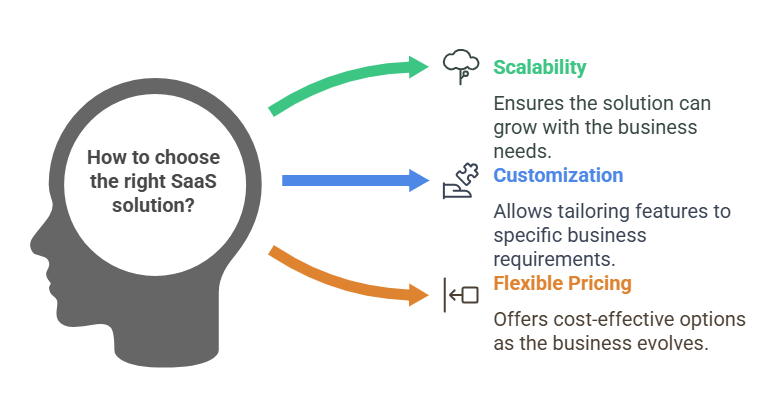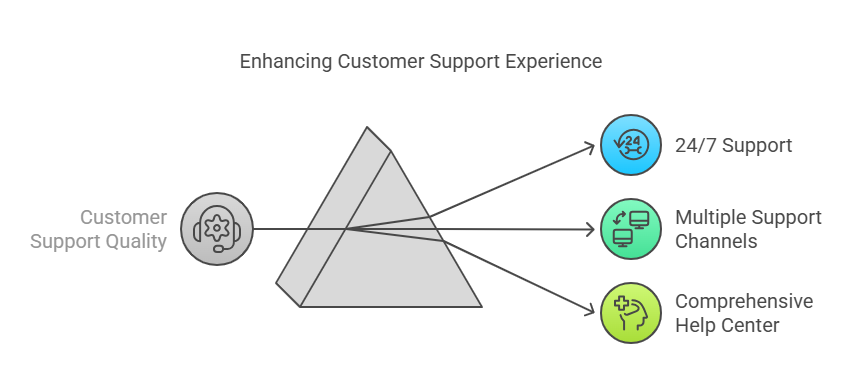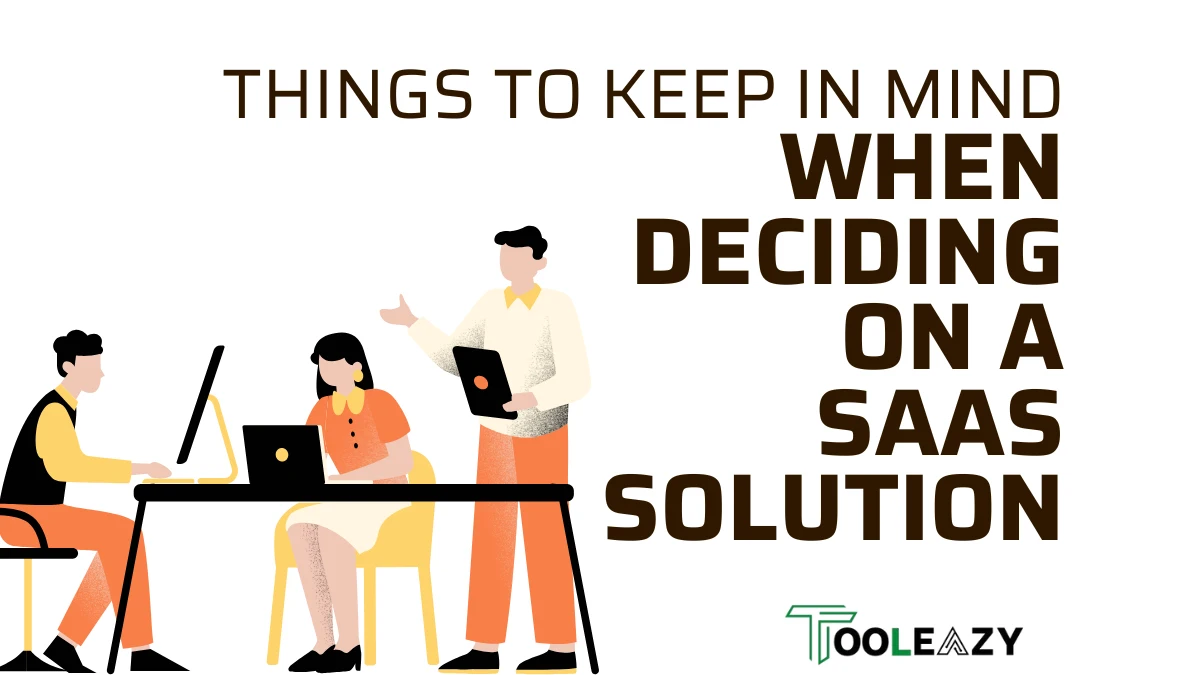Choosing a SaaS solution can be challenging. There are many factors to consider.
Understanding what to look for in a SaaS product is crucial. The right choice can streamline your business operations and improve efficiency. But, the wrong one can lead to unnecessary expenses and frustration. This blog will guide you through the things to keep in mind when deciding on a SaaS solution.
From understanding your business needs to evaluating security features, we will cover it all. By the end, you’ll have a clearer picture of what to look for. So, let’s dive into the key points you should keep in mind for a smart SaaS decision.
Table of Contents
ToggleChoosing The Right Saas Solution
Choosing the right SaaS solution can significantly impact your business. A well-chosen SaaS solution can streamline operations, reduce costs, and improve productivity. But how do you ensure you pick the right one? By focusing on key aspects that align with your business needs and existing infrastructure.
Identify Business Needs
First, clearly identify your business needs. Determine the specific problems you want the SaaS solution to solve. Make a list of features that are essential for your business. Prioritize these features based on their importance. This will help you narrow down your options and focus on solutions that meet your needs.
Assess Current Infrastructure
Next, assess your current infrastructure. Check if your existing systems are compatible with the new SaaS solution. Ensure that your hardware and network can support the new software. Look at the integration options available with your current tools. This can save you from future compatibility issues and additional costs.
Making the right choice involves careful evaluation. By understanding your business needs and assessing your infrastructure, you can make an informed decision that benefits your organization in the long run.

Credit: www.itmagination.com
Evaluating Saas Providers
Choosing the right SaaS provider is crucial for your business success. You need to assess various factors to make an informed decision. This section covers key points to consider when evaluating SaaS providers.
Research Reputable Vendors
Start by researching well-known vendors in the industry. Look for companies with a strong market presence. Ensure they have a history of reliability. This helps you avoid risks with lesser-known providers.
Check their website for detailed information. Review their service offerings. Verify their credentials and certifications. This step ensures the provider meets industry standards.
Check Customer Reviews
Customer reviews offer valuable insights. They reveal the experiences of other users. Positive reviews indicate good service and support. Negative reviews highlight potential issues.
Look for reviews on third-party websites. This provides an unbiased perspective. Pay attention to common complaints. See how the provider responds to feedback. This shows their commitment to customer satisfaction.
Understanding Pricing Models
Choosing a SaaS solution requires careful consideration of pricing models. Evaluate cost structures, scalability, and hidden fees. Ensure the pricing aligns with your budget and growth plans.
Choosing a SaaS solution involves understanding different pricing models. Pricing models can be complex. They vary from one provider to another. Knowing what each model offers helps you make an informed decision. This section will guide you through key points to consider.
Compare Subscription Plans
Subscription plans often differ in features and costs. Some plans offer basic features at a lower price. Others provide advanced tools and support. Look at what each plan includes. Compare it with your needs. You might not need the most expensive plan. Or, you might find a middle-tier plan that suits you better. Always align the plan with your business goals.
Look For Hidden Costs
Hidden costs can surprise you later. Some providers charge extra for add-ons. Others might have fees for customer support. Read the fine print. Understand the total cost. Check if there are fees for upgrades. Or for exceeding usage limits. Knowing all potential costs helps you budget better.
Security And Compliance
Choosing the right SaaS solution involves many factors. Security and compliance are critical aspects to consider. Ensuring data safety and meeting regulations protect your business and customers. Let’s delve into key points.
Check Data Security Measures
Examine the provider’s security protocols. Look for data encryption practices. Data should be encrypted both in transit and at rest. Verify the use of secure data centers. These centers should have strong physical security measures. Understand their incident response plan. They should have a clear procedure for data breaches.
Ensure Regulatory Compliance
Your industry may have specific regulations. Confirm the SaaS provider complies with these rules. Check for compliance with GDPR, HIPAA, or other relevant standards. They should have up-to-date certifications. Review their privacy policy. It should align with your regulatory needs.
Scalability And Flexibility
Choosing a SaaS solution can be daunting. One crucial factor is scalability and flexibility. Your business will grow and change. Your SaaS solution should adapt along with it.
Assess Future Growth
Scalability ensures your software can handle increased demand. How many users will you have in five years? Will your data storage needs grow? A scalable solution can adapt to these changes. Look for flexible pricing plans. Some providers offer tiered pricing. This allows you to pay for only what you need. Make sure the SaaS provider can handle your projected growth. Read reviews. Ask current users about their experiences.
Evaluate Customization Options
Flexibility is key. Each business is unique. Your SaaS should meet your specific needs. Check if the solution offers customization options. Can you modify features? Can you integrate with other tools? A customizable SaaS solution grows with your business. It adapts to changing requirements. Look for easy-to-use APIs. These help with integration.
| Feature | Importance |
|---|---|
| Scalability | High |
| Customization | High |
| Flexible Pricing | Medium |
In summary, choose a SaaS solution that can scale and adapt to your business needs. Assess your future growth and evaluate customization options. This will ensure you make the right decision.

Credit: www.theamegroup.com
Integration Capabilities
When choosing a SaaS solution, integration capabilities are crucial. They ensure your new software works well with your current systems. Let’s explore key aspects of integration capabilities.
Compatibility With Existing Systems
Ensure the SaaS solution is compatible with your existing systems. This avoids disruptions and ensures smooth operations. Check if it supports the platforms and tools you already use. Compatibility reduces the need for extensive changes or additional software. It also helps in maintaining data consistency across systems.
Api Availability
APIs are essential for seamless integration. They allow different software systems to communicate with each other. Check if the SaaS solution offers robust API support. Good APIs enable automation and data exchange. This improves efficiency and reduces manual work. Reliable API availability can significantly ease integration efforts.
User Experience
Choosing the right SaaS solution is crucial for your business. One major factor is the user experience. A good user experience ensures your team can work efficiently and effectively. Here are key points to consider:
Ease Of Use
A SaaS solution must be easy to use. If the software is complicated, your team will struggle. This can lead to frustration and wasted time. Look for a solution with a simple, intuitive interface.
Check if the software offers tutorials or guides. These can help your team get started quickly. User feedback is also important. Look at reviews to see if other users find the software easy to use.
| Feature | Importance |
|---|---|
| Intuitive Interface | High |
| Quick Setup | Medium |
| Clear Tutorials | High |
Customer Support Quality
Good customer support is essential. If issues arise, you need quick solutions. Check if the SaaS provider offers 24/7 support. This ensures help is available when you need it.
Look for multiple support channels. Options like chat, email, and phone support are beneficial. See if the provider has a comprehensive help center or FAQ section. This can save time by providing instant answers to common questions.
- 24/7 Support
- Multiple Support Channels
- Comprehensive Help Center
Remember, a good user experience can make a huge difference. It boosts productivity and satisfaction among your team.

Credit: www.itmagination.com
Trial Periods And Demos
Choosing the right SaaS solution can be challenging. Trial periods and product demos help make this decision easier. They allow you to test features and see if the software fits your needs.
Utilize Free Trials
Most SaaS providers offer free trials. These trials give you a chance to explore the software. Use this time to test all the features. Check the user interface and see how easy it is to navigate. Note any bugs or issues you encounter.
Free trials let you assess the software’s performance. Do tasks take longer than expected? Is the software reliable? Answering these questions during the trial can save you from future headaches.
Request Product Demos
Product demos are another valuable resource. They often involve a walkthrough with a company representative. During a demo, ask questions. Get clarifications on any confusing aspects.
Demos show you how the software works in real-time. This can highlight features you might have missed during a free trial. They also provide an opportunity to see how customer support handles inquiries.
Both free trials and product demos are essential. They provide hands-on experience with the software. Use them wisely to make an informed decision about your SaaS solution.
Frequently Asked Questions
What Is A Saas Solution?
A SaaS solution is software delivered over the Internet. It eliminates the need for physical installation. Users access it via a web browser.
Why Choose A Saas Solution?
SaaS solutions are cost-effective and easy to implement. They offer scalability and automatic updates. They also reduce the need for in-house IT resources.
What Factors To Consider When Selecting Saas?
Consider scalability, security, and integration capabilities. Evaluate customer support and pricing models. Ensure the solution aligns with your business needs.
How Secure Are Saas Solutions?
SaaS providers prioritize security with encryption and regular audits. They also offer compliance with industry standards. Always verify the provider’s security measures.
Conclusion
Choosing the right SaaS solution requires careful thought. Consider your business needs. Evaluate the features and costs. Check customer support options. Read reviews from other users. Ensure the software integrates well with your existing tools. Security and data privacy are crucial.
Test the software with a free trial if available. Make an informed decision for long-term benefits. The right SaaS solution can enhance productivity and efficiency. Keep these points in mind to find the best fit.






3 thoughts on “Things to Keep in Mind When Deciding on a SaaS Solution: Expert Tips”
I don’t think the title of your article matches the content lol. Just kidding, mainly because I had some doubts after reading the article.
Your article helped me a lot, is there any more related content? Thanks!